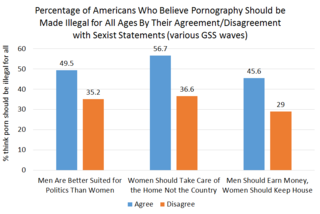Pornography
Misogyny in Porn: It’s Not What You Think
It might actually be some anti-porn activists who hate women.
Posted September 4, 2019 Reviewed by Gary Drevitch

“Pornography is more than just sexual fantasy. It’s cultural violence.”
“Pornography and the construction of misogyny.”
Since the 1980’s, much of the social argument against pornography has centered on the belief that the material is, at core, hateful towards women. The "Take Back the Night" marches began in the 1970's, opposed to pornography, though the group's mission shifted over time to focus on sexual violence. As the above comments illustrate, there is a concern that sexualized images and videos are exploitative of females, relying upon a view of women as nothing more than objectified “meat.” Further, there have long been concerns that viewing pornography breeds misogyny in male viewers, teaching them to treat women as sexual objects.
Unfortunately, research has been inconsistent in support of these arguments, and there particularly has not been research to identify causality between pornography viewing and the development of misogynistic attitudes. As social acceptance of pornography is increasing, attitudes towards it, and its effect, are likely also changing. Some research, exploring the “confluence model” has suggested that for men with misogynistic attitudes and antisocial traits, watching violent pornography (not all pornography, but specifically violent material) does appear to increase risk of sexual violence by those men. However, the researchers identify this effect appears only in a small group of men, around seven percent, with no apparent effect on 93 percent of males. Further, the researchers have indicated there is, at this time, no evidence that changing or restricting these men’s pornography reduces their risk.
Some thoughtful research on the impact of pornography explores a “script model,” suggesting that pornography consumption plays a role in the development of cognitive scripts, the strategies we use in our heads around sex and relationships. In this model, pornography is one part of a complex, multiply-determined and individualized dynamic that influences how people (both males and females) approach sex and sexualized interactions. Where sexual education is deficient, pornography may have greater influence, because viewers don’t understand that the sex in porn is “fantasy sex.” Emily Rothman is one of a few folks spearheading a charge to develop “critical thinking about porn” in adolescents, in a remarkable initiative that may be able to inoculate young people against developing these negative scripts by helping them to understand what porn is, and isn’t.

Recent research on “porn superfans”
has actually found that these men, porn viewers who attend the Las Vegas Adult Entertainment Expo to meet their favorite porn performers, tend to be more feminist and more supportive of women's rights. This research compared 294 men from the Expo, to results on the General Social Survey. Porn superfans, who tended to be educated than most, were also more likely than most men to believe that working mothers can be good mothers, and more were likely to disagree that “traditional gender roles” are better for families. Porn superfans were as likely as others to disagree that men are better suited for politics than women. These porn superfans were men who have made pornography viewing an important part of their lives, who view porn quite often, and yet, they weren’t more misogynistic than the average man, but actually held stronger feminist values.
Similar findings were demonstrated in 2015, when researchers used the GSS data to evaluate whether people who watched pornography were more likely to oppose feminism. In contrast to the claim that “Porn is making hate to women,” the researchers found that people who had watched pornography in the last year were MORE likely to hold egalitarian, feminist values toward women.
There IS evidence of high levels of misogyny in some groups of modern men, however, tangentially related to pornography. Online, there are numerous groups arguing that pornography is damaging and destructive, and stands in the way of men’s success with women. “Incel” is an online term describing men who are “involuntarily celibate.” These men argue that they are being kept from having sex by female control of sexuality. Some argue that it is pornography which fuels the incel movement, leaving men isolated and sexually dissatisfied. Though we have no specific comparison to GSS data, it seems probable that the incel community may hold, in general, less feminist views, though again, we can't identify causality: Are they angry at women because they are incels, or are they celibate because of their anger towards women? After all, these men believe that women owe them sex, and that female sexual independence is somehow an attack on them.

Colleague and researcher Samuel Perry, Ph.D., kindly provided the graphic at left, analyzing the relationship between opposition to pornography and feminist values. As shown, those who believe pornography should be illegal are very unlikely to endorse egalitarian values.
One place where we do have an academic publication is an analysis of “discourses of masculinity within an online pornography abstinence forum.” Similar to the incel community, there are large, vocal, and committed groups of men who join online discussion groups, seeking help to stop masturbating to pornography. There’s a complex overlap between the incel community and those who advocate against masturbation to porn: “Themes like abstaining from masturbation and, even more, contempt towards and fighting of porn have been a key characteristic of the incel community of late.” Like the incel community, the groups arguing against masturbation to pornography hearken back to antiquated ideas that masturbation somehow depletes men, and leads them to be less successful at obtaining “real” sex with females.
Again, we sadly have no comparison to GSS data, but Taylor and Jackson (2018) did extensive analysis of one of these anti-masturbation to porn sites, and found extraordinary examples of misogynistic and sexist comments. (All quotes below are from their paper, found here.)
- “There’s nothing shameful about f***ing a hot young girl, you feel like the king of the jungle afterwards that’s what we are meant to do! F*** girls. Not jerk off like lonely losers to pixels on a screen. He makes some good points in the book, doesn’t mean I became a feminist and grew a vagina after reading it.”
- “[It] is not only about overcoming our addiction over porn and masturbation, it is also about reconnecting with our inner masculinity. So lets come out of our fantasies and begin to connect with real women. Lets love them and have meaningful sex with them and show Philip Zimbardo that it is the beginning of the end of the Demise of guys!!! Can we do it??? Yes we can!!!!” (Zimbardo is a well-known psychologist and author of The Demise of Guys, who has suggested that addiction to online pornography has led to young men becoming less manly.)
Though there are claims that women also participate in these online anti-pornography discussions, Taylor and Jackson describe that in a thread about women in these groups, the discussion became a “sea of negativity,” enforcing a “boys club” position. The researchers go on to demonstrate how men in these groups view women: “The only difference porn has made is that like women who treat men as disposable, now men treat women as disposable as well and they don’t like it…”
Taylor and Jackson express that they themselves were surprised to find such levels of anti-female, anti-feminist rhetoric amidst these anti-pornography discussions:
“Whereas a website committed to the rejection of pornography might have been expected to be a site of ‘progressive’ or ‘unconventional’ expressions of masculinity aligning with anti-pornography feminist concerns,” and went on to suggest: “the construction of men as dominant seekers of pleasure and women as the ‘natural’ suppliers of this pleasure within the data (through both ‘innate masculinity’ and ‘real heterosexuality’ discourses) simply reproduced ‘common sense’ sexual expectations of gendered dominance and submission.”
Thus, women are portrayed in these discussions as property, obstacles, and indeed, as objects, rather than beings with their own autonomy and agency.

Misogyny, or hatred of women, feeds on the view that when women win, men must lose. Power is a zero-sum game in these arguments: There’s only so much to go around, and for women to gain sexual autonomy and agency, men must relinquish it. Further, when men’s sense of masculinity depends upon their success at acquiring sex (with females), men must then view women as opponents, in a battle over control and access to sex. Even women perpetuate these beliefs, with extensive research showing that it is women who attack and denigrate other women for being too sexual. In one study of misogyny in online social media, women were more likely than men to attack other women as “sluts” or “whores.”
The origins of misogyny aren’t simple, but it’s likely that traditional gender stereotypes, lack of positive experience with females in power, and upbringing in traditional, conservative, and closed moral communities play a substantial role. It then perhaps makes sense that highly conservative, traditional, and gender-stereotyped groups are the most vocal in opposition to pornography, and where high levels of misogyny creep into their discussions. Surprisingly, modern radical opposition to pornography may in fact be more of an indicator of misogynistic attitudes as opposed to feminist values.




